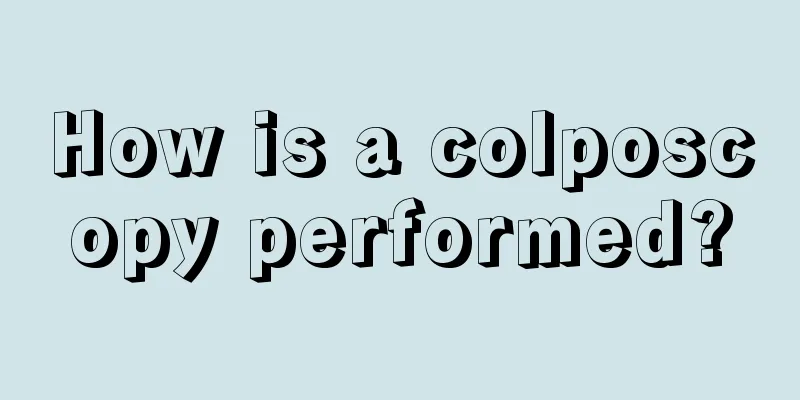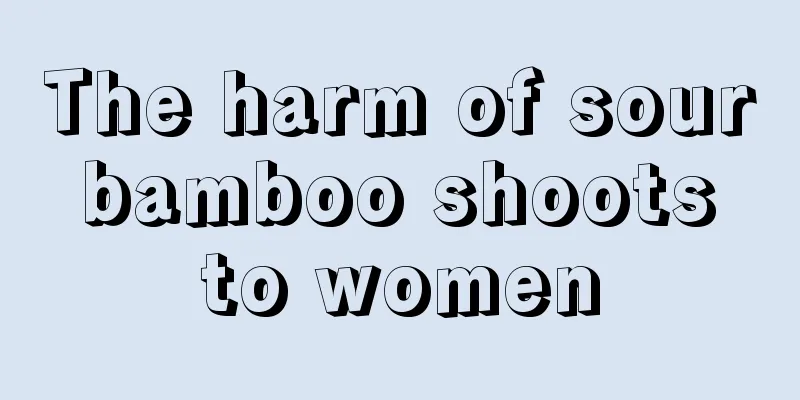Will ovulation occur if there are follicles? An authoritative doctor is here to answer!

|
As we all know, female friends have menstruation every month. Similarly, there is an ovulation period every month. Normal ovulation is very important for every woman, but many conditions are required to ovulate qualified follicles. It is not that the ovulation can be successfully carried out if there are follicles in the body. Only mature follicles can be successfully discharged. 1. How big is the follicle when ovulation occurs How big the follicle must be before ovulation occurs depends on the specific situation. The size of each person's follicle is different before ovulation occurs. If you want to know the exact time of ovulation, you can monitor an ovulation cycle through B-ultrasound. Generally, when the follicle grows to more than 20mm, it is mature and can be discharged in one to two days. Only eggs released from mature follicles can give birth to smart children, which is a necessary condition for eugenics. 2. There are follicles but no ovulation Generally speaking, a woman releases an egg during each menstrual cycle. The successful release of an egg is a very complex process, which gradually develops from the primordial follicle to the dominant follicle, and finally becomes a mature follicle and is released from the ovary. So, what happens if there are follicles but no ovulation? The ovaries have follicles but do not ovulate, which may be caused by the following reasons. 1. Central endocrine disorders. Ovulation is a complex process involving the coordinated action of multiple hormones. When the central endocrine system is disordered, the peak secretion level of luteinizing hormone (LH) is insufficient to stimulate the biochemical and histological changes that lead to the digestion and rupture of the follicle wall, thereby affecting the growth and development of the follicle and the occurrence of ovulation. 2. Local obstacles. Endometriosis, pelvic inflammatory disease, etc. can cause follicles to not ovulate. Take pelvic inflammatory disease as an example. When the fallopian tubes become inflamed, they will thicken, become fibrotic and become cord-like, and may even adhere to the ovaries, uterus and surrounding organs and tissues, forming a hard and fixed mass. In severe cases, it will hinder ovulation from the ovaries. 3. Enzyme deficiency or prostaglandin deficiency. The enlarged follicles are close to the ovarian cortex, and fibrinolysozyme, activated collagenase, and prostaglandins act on the basement membrane of the follicle wall, digesting the follicle wall and causing the formation of the ovarian ovulation pore. If there is a lack of enzymes or prostaglandins at this time, it will greatly affect the discharge of eggs. 4. Hyperprolactinemia. Prolactin affects the normal secretion of gonadotropin from the pituitary gland, thereby causing ovarian dysfunction and affecting the normal development of follicles and the ovulation function of the ovaries. Increased blood prolactin levels reduce the secretion of blood follicle-stimulating hormone, leading to impaired or incomplete development of ovarian follicles, and ultimately leading to anovulation or infertility. 3. The dominant follicle does not ovulate Why does the dominant follicle not ovulate? The so-called dominant follicle in medicine refers to a follicle with a diameter greater than 10mm and less than 18mm as seen on ultrasound. Under the action of estrogen, one follicle will develop into the dominant follicle every month, but if the process is affected by central nervous system diseases, systemic diseases, ovarian diseases, etc., even the dominant follicle will not be able to ovulate. 1. Central diseases: Dysfunction of the hypothalamus-pituitary-ovarian axis can cause symptoms such as menstrual disorders, anovulation, and amenorrhea in women. Pituitary tumors can cause ovarian dysfunction and lead to infertility. 2. Endocrine diseases: Endocrine metabolic diseases such as hyperthyroidism or hypothyroidism, hyperadrenal cortex function or hypofunction, severe diabetes, etc. can induce ovarian infertility. 3. Ovarian diseases: Congenital ovarian dysgenesis, polycystic ovary syndrome, premature ovarian failure, functional ovarian tumors, etc. can all affect normal ovulation. 4. Malnutrition: Severe malnutrition, excessive obesity or lack of certain vitamins in the diet can lead to endocrine disorders, thereby affecting ovarian function and resulting in dominant follicles but no ovulation. |
<<: Can I drink ginger and brown sugar water during menstruation?
>>: What causes bleeding outside of menstrual periods?
Recommend
What is the cause of brown discharge at 42 days of pregnancy?
Many pregnant women are very happy when they firs...
Is 2mm endometrium normal?
As we all know, the womb is an area where new lif...
How does Traditional Chinese Medicine treat dysmenorrhea?
Some women often complain about how difficult it ...
What does amniotic fluid level 3 mean?
Grade 3 amniotic fluid mainly refers to the degre...
Why have my breasts been swollen and painful recently?
Every woman may experience breast tenderness at s...
How to treat uterine wall prolapse?
Many surveys have found that most women now do no...
How to treat moderate to severe cervical erosion?
When cervical erosion becomes moderate or severe,...
Will there be any sequelae after infection with Omicron? When should I seek medical attention? Authoritative answers——
The "new ten" measures to further optim...
Is it normal to have abdominal pain during ovulation?
The ovulation period is a period that women exper...
How many fingers should be opened to give birth to a child?
When the due date is approaching, pregnant women ...
What causes vaginal itching and pain?
When vaginal itching and pain occur, it is best t...
Basic requirements during exercise
Basic requirements during exercise Firmly establi...
The five most beautiful moments of a woman
Woman wedding day A woman is the most beautiful o...
What to eat in the first month of pregnancy is good for the fetus
The baby is the most important thing for every wo...
When does a woman's ovulation period begin?
A woman's ovulation period needs to be calcul...
![[Medical Q&A] Do all uterine fibroids require surgery? How long after surgery can I prepare for pregnancy?](/upload/images/67effb6b19024.webp)








